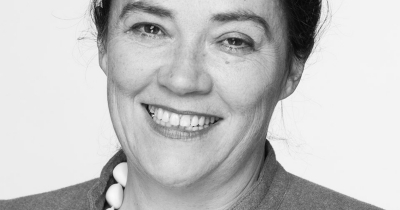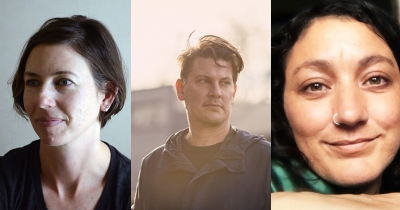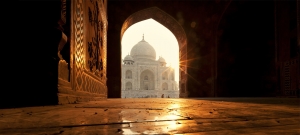Competitions and programs (112)
2020 Peter Porter Poetry Prize winner
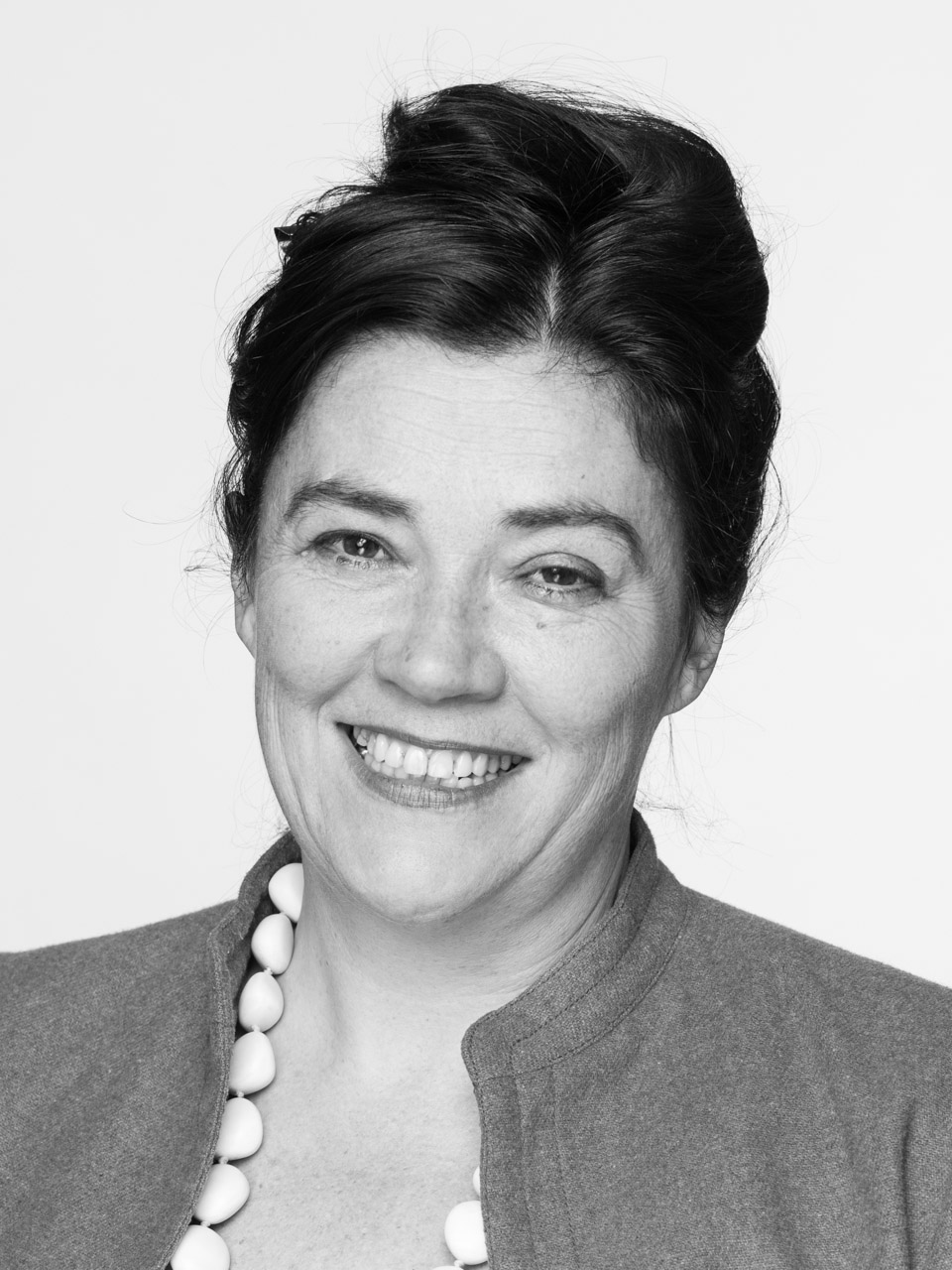 A. Frances JohnsonA. Frances Johnson is the winner of the 2020 Peter Porter Poetry Prize, worth a total of $9,000. This was announced at a ceremony at the Boyd Hub Community Center in Melbourne on January 16.
A. Frances JohnsonA. Frances Johnson is the winner of the 2020 Peter Porter Poetry Prize, worth a total of $9,000. This was announced at a ceremony at the Boyd Hub Community Center in Melbourne on January 16.
A. Frances Johnson's winning poem is titled 'My Father's Thesaurus'. She receives $7,000, while the four other shortlisted poets each receive $500. The full shortlist, including the winning poem, is available to read online and is published in the January–February issue of ABR.
This year’s judges – John Hawke, Bronwyn Lea, and Philip Mead – shortlisted five poems from almost 1,050 entries, from 30 countries. The shortlisted poets were Lachlan Brown (NSW), Claire G. Coleman (Vic.), Ross Gillett (Vic.), A. Frances Johnson (Vic. ), and Julie Manning (QLD).
Congratulations to A. Frances Johnson and to all the poets shortlisted and longlisted in the 2020 Peter Porter Poetry Prize.
In their report the judges noted:
‘This year’s record field demonstrates both the depth and stylistic range evident in this vital area of our literature. The poems were notable for the currency of their engagement with social issues. “My Father’s Thesaurus” by A. Frances Johnson is an unsentimental yet emotive portrayal of the situation of the elderly and their carers.’
On learning of her win, Johnson commented:
‘It was a complete honour to stand shoulder to shoulder with the fine poets on the Peter Porter Prize shortlist. These encouragements for writers in the current cultural and political climate cannot be underestimated. They spur us on to do more, to speak up. I hope my poem honours my late father, Tom, and offers a small bridge to others who have suffered or who are experiencing the terrible affliction of Alzheimer’s. I acknowledge the great work of other Australian poets on dementia topics (Sarah Holland-Batt, Jessica Wilkinson, and others). Terrible mega-fires currently afflict us on the outside, but this illness is a bushfire inside the brain, impossible to contain, still under-resourced. Despite the confusions and word salads, in Dad’s last months we were lucky that there were still ways of finding him, being with him, holding him. I know others have gleaned similar precious communication with loved ones in the last stages of this terrible disease, though sadly, it may not work out that way. Poetry and of course music are often used in aged-care settings to enable sufferers to de-scramble, to maintain a hold on language. Poetry has certainly helped me hold Dad close.’
About A. Frances Johnson
A. Frances Johnson is a writer and artist. She has published three collections of poetry. A fourth collection, Save As, is forthcoming (Puncher & Wattmann, 2020). Her recent collection, Rendition for Harp and Kalashnikov (Puncher & Wattmann, 2017) was shortlisted in the 2018 Melbourne Prize for Literature Best New Writing Award and, in 2017, she took up an Australia Council B.R. Whiting Fellowship to Rome. A novel, Eugene’s Falls (Arcadia 2007), retraces the Victorian journeys of colonial painter Eugene von Guérard. A new novel in progress, The Lost Garden, explores first-contact histories in remote Southern Tasmania, evoking early horticultural attempts to colonise by seed. A monograph, Australian Fiction as Archival Salvage, was published by Brill in 2015.
Further information
The Peter Porter Poetry Prize is one of Australia’s most prestigious poetry awards.
Subscribe to ABR to gain access to this issue online, plus the ABR archive.
Click here for more information about past winners.
We gratefully acknowledge the long-standing support of Morag Fraser AM and Andrew Taylor AM.
2020 ABR Elizabeth Jolley Short Story Prize
Australian Book Review is delighted to announce the shortlist for this year’s ABR Elizabeth Jolley Short Story Prize, worth a total of $12,500. This year’s Jolley Prize received a record field of 1450 entries from 34 countries, and was judged by Gregory Day, Josephine Rowe, and Ellen van Neerven.
ABR will publish the three shortlisted stories in the 2020 August Fiction Issue. Details are listed below on how to attend a Zoom ceremony on August 13, when we will announce the winner.
Congratulations to the shortlisted entrants, and we thank all those who submitted their stories to the Jolley Prize.
The Shortlist
C.J. Garrow for 'Egg Timer'
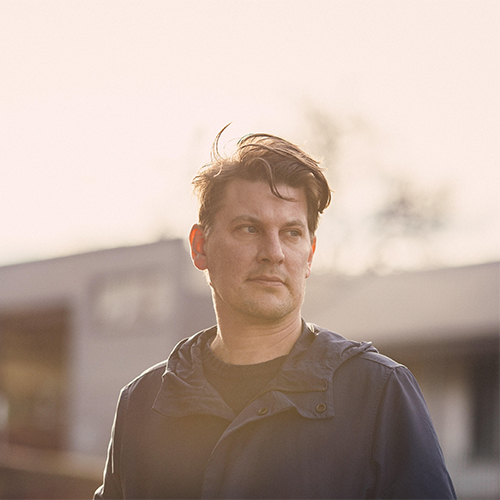 C.J. Garrow is a Melbourne writer whose fiction has been shortlisted for international prizes including the Fish Prize (Ireland) and the George Garrett Fiction Prize (USA). ‘Egg Timer’ is his first published work of fiction.
C.J. Garrow is a Melbourne writer whose fiction has been shortlisted for international prizes including the Fish Prize (Ireland) and the George Garrett Fiction Prize (USA). ‘Egg Timer’ is his first published work of fiction.
Simone Hollander for 'Hieroglyph'
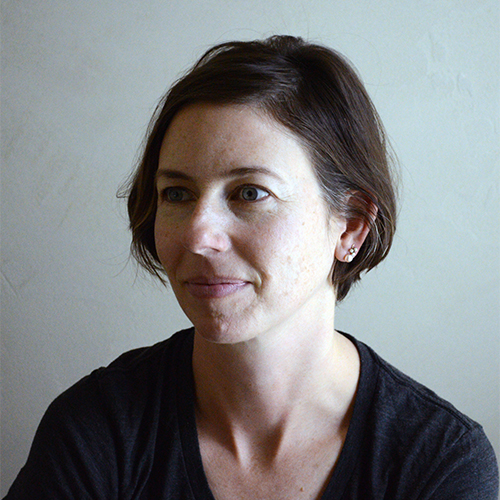 Simone Hollander is a writer from Monterey Bay, California. Her MFA in Creative Writing from the University of Washington was completed on independent study from Dublin, Ireland. She has won prizes for her short fiction and creative non-fiction, and has served as a delegate on a writers’ cultural exchange to China. Her work can be found in PageBoy Magazine, The Weeklings, The Seattle Review, The Dublin Quarterly, and other literary niches. Simone has worked in public, private, and university libraries. She lives with her family, animals, the mountains, in Longmont, Colorado. She is writing a novel.
Simone Hollander is a writer from Monterey Bay, California. Her MFA in Creative Writing from the University of Washington was completed on independent study from Dublin, Ireland. She has won prizes for her short fiction and creative non-fiction, and has served as a delegate on a writers’ cultural exchange to China. Her work can be found in PageBoy Magazine, The Weeklings, The Seattle Review, The Dublin Quarterly, and other literary niches. Simone has worked in public, private, and university libraries. She lives with her family, animals, the mountains, in Longmont, Colorado. She is writing a novel.
Mykaela Saunders for 'River Story'
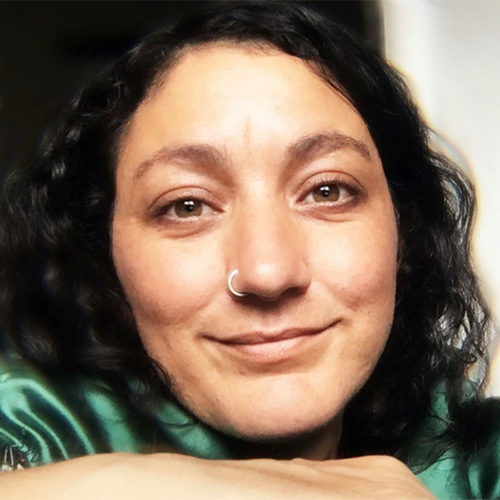 Mykaela Saunders is a Koori writer, teacher, and community researcher. Of Dharug and Lebanese ancestry, she’s working-class and queer, and belongs to the Tweed Aboriginal community. Mykaela has worked in Aboriginal education since 2003, and her research explores trans-generational trauma and healing in her community. Mykaela began writing fiction and poetry in 2017, as part of her Doctor of Arts degree at the University of Sydney. Her work has since been published across forms and disciplines, placed in writing prizes, and attracted funding and fellowships.
Mykaela Saunders is a Koori writer, teacher, and community researcher. Of Dharug and Lebanese ancestry, she’s working-class and queer, and belongs to the Tweed Aboriginal community. Mykaela has worked in Aboriginal education since 2003, and her research explores trans-generational trauma and healing in her community. Mykaela began writing fiction and poetry in 2017, as part of her Doctor of Arts degree at the University of Sydney. Her work has since been published across forms and disciplines, placed in writing prizes, and attracted funding and fellowships.
Highly commended
'Lucky Charms' by Jennifer Down (VIC, Australia)
'I Believe' by V. Sanjay Kumar (India)
'Wait for Me' by Jasmin McGaughey (QLD, Australia)
'Two Africas' by Jean McNeil (UK)
'Bedford Jeune' by Lauren Sarazen (France)
Join us to announce the winner
The winner will be announced at a Zoom ceremony on August 13. The event will feature readings from all the shortlisted authors, with ABR then announcing the winner. This is a free public event and all are welcome, but bookings are essential. A Zoom access link will be sent out prior to the event.
When: 6 for 6.15 pm on Thursday, 13 August 2020
Where: A Zoom ceremony. An access link will be sent out before the event.
Bookings: This is a free public event and all are welcome, but bookings are essential.
How to book: Register your attendance by emailing This email address is being protected from spambots. You need JavaScript enabled to view it.
ABR gratefully acknowledges Ian Dickson's generous support for the Jolley Prize.
Win a holiday in India with Abercrombie & Kent!
Update from Australian Book Review - March 2020
Thank you for your many interesting and thoughtful contributions to the Passage to India competition. In the circumstances, ABR and our partner Abercrombie & Kent think it would be incongruous to announce the winner at this stage, when international travel is moot at best and when such grave issues are uppermost in everyone’s mind. We will name the winner in coming weeks.
About the competition
In a first for Australian Book Review, we are delighted to be partnering with luxury travel company Abercrombie & Kent to offer one lucky ABR subscriber the chance to win a ten-day adventure for two in India worth up to AU$8,250. The prize is Abercrombie & Kent’s 'Essential India’ tour, a seven-day private journey from Delhi to Agra to Jaipur, staying in luxury Taj hotels throughout, plus the winner’s choice of a three-day extension to either Ranthambore, Udaipur, or Varanasi.
To be in the running to win this magnificent prize, subscribers needed to tell us – in fifty to one hundred words – about a book that has inspired them to travel, or to dream of travelling.
Entry for this competition has now closed.
Terms and Conditions apply and can be found here. By entering this promotion you agree that you have read the Terms and Conditions and will abide by them.
2020 Calibre Essay Prize Judges
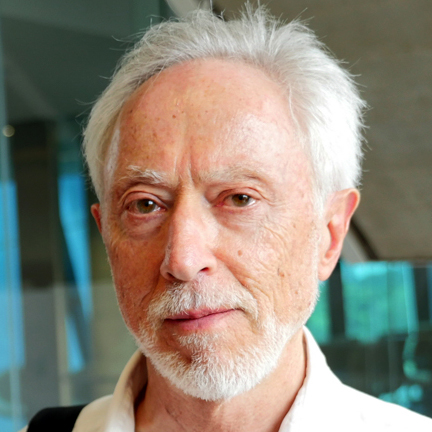 J.M. Coetzee was born in South Africa and educated in South Africa and the United States. He has published nineteen works of fiction, as well as criticism and translations. Among awards he has won are the Booker Prize (twice) and, in 2003, the Nobel Prize for Literature. He is currently Professorial Research Fellow at the University of Adelaide.
J.M. Coetzee was born in South Africa and educated in South Africa and the United States. He has published nineteen works of fiction, as well as criticism and translations. Among awards he has won are the Booker Prize (twice) and, in 2003, the Nobel Prize for Literature. He is currently Professorial Research Fellow at the University of Adelaide.
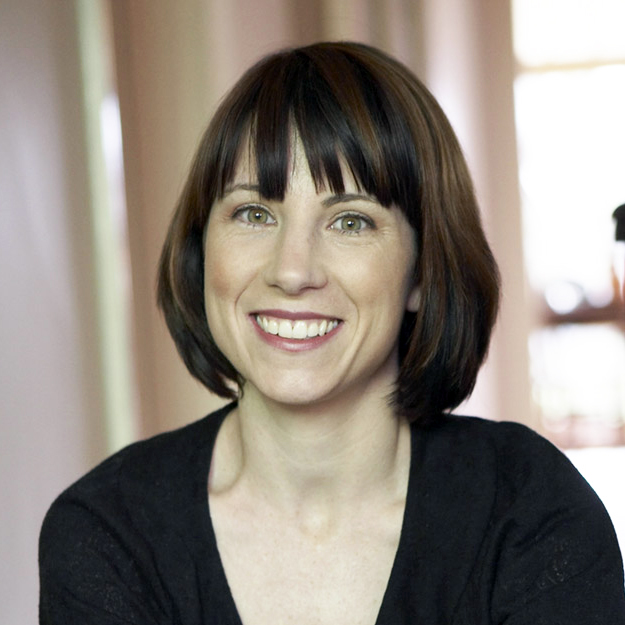 Lisa Gorton, who lives in Melbourne, is a poet, novelist, and critic, and a former Poetry Editor of ABR. She studied at the Universities of Melbourne and Oxford. A Rhodes Scholar, she completed a Masters in Renaissance Literature and a Doctorate on John Donne at Oxford University. Her review essays and poetry have appeared in ABR since 2002. Her first poetry collection, Press Release (2007), won the Victorian Premier’s Prize for Poetry. She has also been awarded the Vincent Buckley Poetry Prize and the Philip Hodgins Memorial Medal. Lisa’s novel The Life of Houses (2015) shared the 2016 Prime Minister’s Award for fiction and received the NSW Premier’s People’s Choice Award. Her third poetry collection Empirical appeared with Giramondo in 2019.
Lisa Gorton, who lives in Melbourne, is a poet, novelist, and critic, and a former Poetry Editor of ABR. She studied at the Universities of Melbourne and Oxford. A Rhodes Scholar, she completed a Masters in Renaissance Literature and a Doctorate on John Donne at Oxford University. Her review essays and poetry have appeared in ABR since 2002. Her first poetry collection, Press Release (2007), won the Victorian Premier’s Prize for Poetry. She has also been awarded the Vincent Buckley Poetry Prize and the Philip Hodgins Memorial Medal. Lisa’s novel The Life of Houses (2015) shared the 2016 Prime Minister’s Award for fiction and received the NSW Premier’s People’s Choice Award. Her third poetry collection Empirical appeared with Giramondo in 2019.
 Peter Rose has been Editor of Australian Book Review since 2001. Previously he was a publisher at Oxford University Press. His reviews and essays have appeared mostly in ABR. He has published six books of poetry, two novels, and a family memoir, Rose Boys (Text Publishing), which won the 2003 National Biography Award. He edited the 2007 and 2008 editions of The Best Australian Poems (Black Inc.). His most recent publication is a volume of poems, The Subject of Feeling (UWA Publishing, 2015).
Peter Rose has been Editor of Australian Book Review since 2001. Previously he was a publisher at Oxford University Press. His reviews and essays have appeared mostly in ABR. He has published six books of poetry, two novels, and a family memoir, Rose Boys (Text Publishing), which won the 2003 National Biography Award. He edited the 2007 and 2008 editions of The Best Australian Poems (Black Inc.). His most recent publication is a volume of poems, The Subject of Feeling (UWA Publishing, 2015).
Winner | 2019 Jolley Prize | Sonja Dechian for 'The Point-Blank Murder'
2019 Jolley Prize Winner: Sonja Dechian
ABR is delighted to announce that Sonja Dechian is the overall winner of the 2019 ABR Elizabeth Jolley Short Story Prize for her story ‘The Point-Blank Murder’. Sonja Dechian receives $5,000. Raaza Jamshed was placed second for her story 'Miracle Windows', and Morgan Nunan was placed third for his story 'Rubble Boy'. We would like to congratulate all three shortlisted entrants and thank all those who entered their stories in the Jolley Prize.
The ABR Elizabeth Jolley Short Story Prize is one of the country’s most prestigious awards for short fiction. This year the Jolley Prize attracted almost 1,400 entries from 35 different countries. The judges were Maxine Beneba Clarke, John Kinsella, and Beejay Silcox. The three shortlisted stories appear in our September Fiction 2018 issue.
About Sonja Dechian
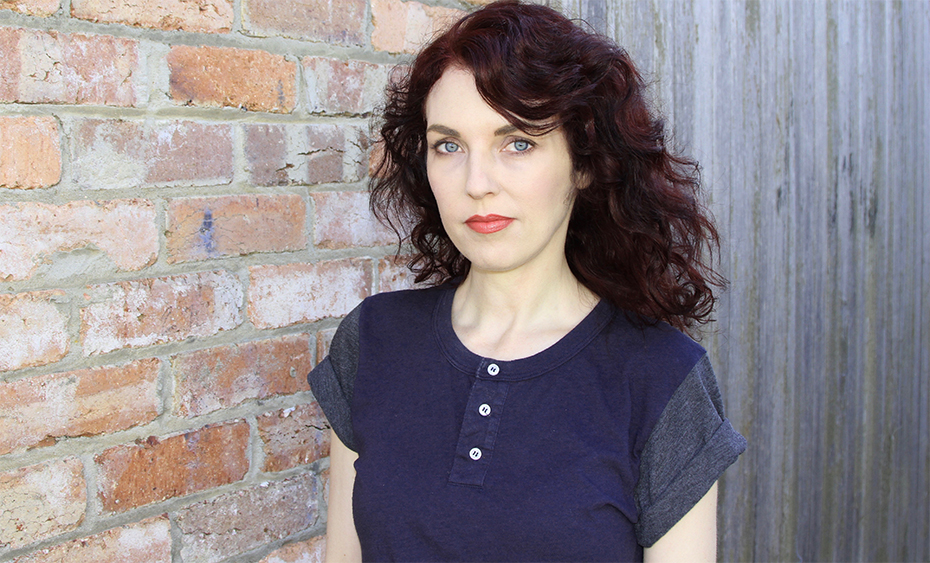 Sonja Dechian (photograph supplied)
Sonja Dechian (photograph supplied)
Sonja Dechian is the author of the short story collection An Astronaut’s Life, which won the 2016 UTS Glenda Adams Award for New Writing and was shortlisted for the Steele Rudd Award the same year. Her writing has previously appeared in The Best Australian Stories, New Australian Stories 2, and elsewhere. She has co-edited two books of children’s writing about the Australian refugee experience, No Place Like Home and Dark Dreams.
ABR Arts | Giveaways
How to enter
To be in the running for any of our giveaways, please email Rosemary Blackney at This email address is being protected from spambots. You need JavaScript enabled to view it., using the subject line ‘ABR Arts Giveaways’, with your full name and contact details. Please specify in your email which giveaway you are interested in.
When distributing giveaways we naturally give preference to those with current paid subscriptions and those who have not received a recent ABR giveaway.
Click here to subscribe from $10 a month.
Die Meistersinger von Nürnberg (Melbourne Opera) • 2 double passes
We are delighted to offer two double passes to the opening night of Die Meistersinger von Nürnberg, presented by Melbourne Opera. Richard Wagner’s epic comedy masterpiece will be performed at the world heritage-listed Royal Exhibition Building in Melbourne between February 16 and 22. These tickets are for use on opening night only (Feb 16).
Maria (Kismet) • 5 double passes
We are delighted to offer five double passes to Maria, starring Academy Award-winner Angelina Jolie as the American-Greek opera soprano, Maria Callas. Maria reimagines the opera legend in her final days while reckoning with her identity and life. Maria is in cinemas nationally from January 30.
2020 Porter Prize Judges
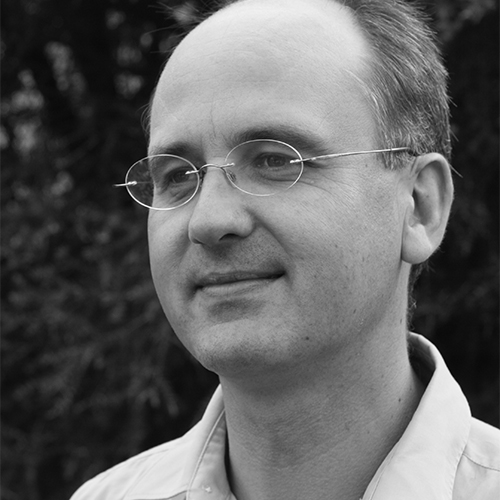 John Hawke is a Senior Lecturer, specialising in poetry, at Monash University. His books include Australian Literature and the Symbolist Movement, Poetry and the Trace (co-edited with Ann Vickery), and the volume of poetry Aurelia, which received the 2015 Anne Elder award. He is ABR's Poetry Editor.
John Hawke is a Senior Lecturer, specialising in poetry, at Monash University. His books include Australian Literature and the Symbolist Movement, Poetry and the Trace (co-edited with Ann Vickery), and the volume of poetry Aurelia, which received the 2015 Anne Elder award. He is ABR's Poetry Editor.
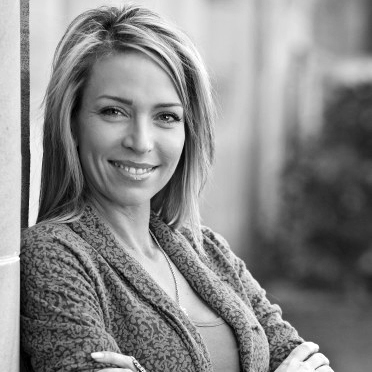 Bronwyn Lea was born in Tasmania and grew up in Queensland and Papua New Guinea. She is the author of Flight Animals (UQP, 2001), winner of the Wesley Michel Wright Prize and the FAW Anne Elder Award, and The Other Way Out (Giramondo, 2008), which won the WA Premier’s Book Award for Poetry and the SA Premier’s John Bray Poetry Prize.
Bronwyn Lea was born in Tasmania and grew up in Queensland and Papua New Guinea. She is the author of Flight Animals (UQP, 2001), winner of the Wesley Michel Wright Prize and the FAW Anne Elder Award, and The Other Way Out (Giramondo, 2008), which won the WA Premier’s Book Award for Poetry and the SA Premier’s John Bray Poetry Prize.
 Philip Mead has worked at the University of Melbourne, as Lockie Fellow in Creative Writing and Australian Literature, at the University of Tasmania, and at the University of Western Australia as the inaugural Chair of Australian Literature and Director of the Westerly Centre. He has co-edited The Penguin Book of Modern Australian Poetry (with John Tranter) (2004) and is the author of Networked Language: Culture and History in Australian Poetry (2010) and of the Vagabond Press poetry collection, Zanzibar Light (2019).
Philip Mead has worked at the University of Melbourne, as Lockie Fellow in Creative Writing and Australian Literature, at the University of Tasmania, and at the University of Western Australia as the inaugural Chair of Australian Literature and Director of the Westerly Centre. He has co-edited The Penguin Book of Modern Australian Poetry (with John Tranter) (2004) and is the author of Networked Language: Culture and History in Australian Poetry (2010) and of the Vagabond Press poetry collection, Zanzibar Light (2019).
2020 Peter Porter Poetry Prize
Australian Book Review is delighted to announce the shortlist for the 2020 Peter Porter Poetry Prize. First presented in 2005, the Porter Prize is one of the world’s leading prizes for a new poem. It is worth a total of $9,000. This year, our judges – John Hawke, Bronwyn Lea, and Philip Mead – had nearly 1,050 poems to assess, the largest field in the history of the Porter Prize.
The shortlisted poems appear in our January–February 2020 issue.
'Precision Signs' by Lachlan Brown (NSW)
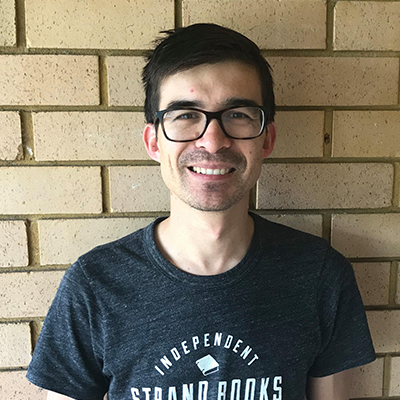 Lachlan Brown is a senior lecturer in English at Charles Sturt University, Wagga Wagga. He is the author of Limited Cities (Giramondo, 2012) and Lunar Inheritance (Giramondo, 2017). Lachlan’s poetry has been published in various journals including Antipodes, Cordite, Rabbit, and St Mark’s Review. Lachlan has been shortlisted and commended for various poetry prizes including the Mary Gilmore Prize, the Newcastle Poetry Prize, the Gwen Harwood Poetry Prize, the Judith Wright Poetry Prize, and the Macquarie Fields Poetry Prize. Lachlan is currently the vice-president of Booranga Writers Centre in Wagga Wagga.
Lachlan Brown is a senior lecturer in English at Charles Sturt University, Wagga Wagga. He is the author of Limited Cities (Giramondo, 2012) and Lunar Inheritance (Giramondo, 2017). Lachlan’s poetry has been published in various journals including Antipodes, Cordite, Rabbit, and St Mark’s Review. Lachlan has been shortlisted and commended for various poetry prizes including the Mary Gilmore Prize, the Newcastle Poetry Prize, the Gwen Harwood Poetry Prize, the Judith Wright Poetry Prize, and the Macquarie Fields Poetry Prize. Lachlan is currently the vice-president of Booranga Writers Centre in Wagga Wagga.
'That Wadjela Tongue' by Claire G. Coleman (Vic.)
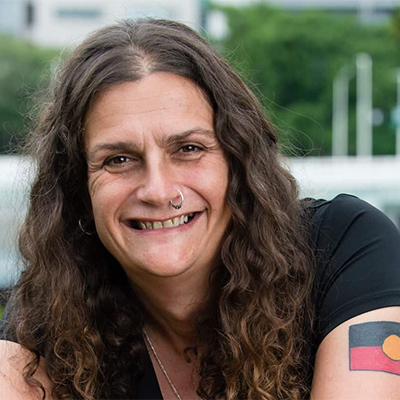 Claire G. Coleman is a Wirlomin Noongar woman whose ancestral country is on the south coast of Western Australia. Her novel Terra Nullius, published by Hachette in Australia and Small Beer Press in the United States, won a black&write! Fellowship and a Norma K. Hemming Award and was shortlisted for the Stella Prize and the Aurealis Science Fiction Award. She writes poetry, short-fiction, and essays, and has been published in The Saturday Paper, The Guardian, Meanjin, Australian Poetry, Art Collector, The ABC, Griffith Review, Overland, Timothy McSweeny’s Quarterly Concern, and many others. The Old Lie (Hachette 2019) is her second novel.
Claire G. Coleman is a Wirlomin Noongar woman whose ancestral country is on the south coast of Western Australia. Her novel Terra Nullius, published by Hachette in Australia and Small Beer Press in the United States, won a black&write! Fellowship and a Norma K. Hemming Award and was shortlisted for the Stella Prize and the Aurealis Science Fiction Award. She writes poetry, short-fiction, and essays, and has been published in The Saturday Paper, The Guardian, Meanjin, Australian Poetry, Art Collector, The ABC, Griffith Review, Overland, Timothy McSweeny’s Quarterly Concern, and many others. The Old Lie (Hachette 2019) is her second novel.
'South Coast Sonnets' by Ross Gillett (Vic.)
 Ross Gillett is a Melbourne-born poet who now lives in Daylesford in the Central Highlands of Victoria. His poems have appeared in The Age, The Australian, and The Canberra Times, in journals in Australia and the United States, and in three editions of Black Inc.’s former series The Best Australian Poems. His book The Sea Factory was one of the Five Islands Press New Poets 2006 series. In 2010 he published a chapbook of old and new poems – Wundawax and other poems – with Mark Time Books. His new book The Mirror Hurlers has just been published by Puncher & Wattmann. He has been twice shortlisted for the Blake Poetry Prize, and his poem ‘The Mirror Hurlers’ was shortlisted for the 2019 Peter Porter Poetry Prize.
Ross Gillett is a Melbourne-born poet who now lives in Daylesford in the Central Highlands of Victoria. His poems have appeared in The Age, The Australian, and The Canberra Times, in journals in Australia and the United States, and in three editions of Black Inc.’s former series The Best Australian Poems. His book The Sea Factory was one of the Five Islands Press New Poets 2006 series. In 2010 he published a chapbook of old and new poems – Wundawax and other poems – with Mark Time Books. His new book The Mirror Hurlers has just been published by Puncher & Wattmann. He has been twice shortlisted for the Blake Poetry Prize, and his poem ‘The Mirror Hurlers’ was shortlisted for the 2019 Peter Porter Poetry Prize.
'My Father's Thesaurus' by A. Frances Johnson (Vic.)
 A. Frances Johnson is a writer and artist. She has published three collections of poetry. A fourth collection, Save As, is forthcoming (Puncher & Wattmann, 2020). Her recent collection, Rendition for Harp and Kalashnikov (Puncher & Wattmann, 2017) was shortlisted in the 2018 Melbourne Prize for Literature Best New Writing Award and, in 2017, she took up an Australia Council B.R. Whiting Fellowship to Rome. A novel, Eugene's Falls (Arcadia 2007), retraces the Victorian journeys of colonial painter Eugene von Guérard. A new novel in progress, The Lost Garden, explores first-contact histories in remote Southern Tasmania, evoking early horticultural attempts to colonise by seed. A monograph, Australian Fiction as Archival Salvage, was published by Brill in 2015.
A. Frances Johnson is a writer and artist. She has published three collections of poetry. A fourth collection, Save As, is forthcoming (Puncher & Wattmann, 2020). Her recent collection, Rendition for Harp and Kalashnikov (Puncher & Wattmann, 2017) was shortlisted in the 2018 Melbourne Prize for Literature Best New Writing Award and, in 2017, she took up an Australia Council B.R. Whiting Fellowship to Rome. A novel, Eugene's Falls (Arcadia 2007), retraces the Victorian journeys of colonial painter Eugene von Guérard. A new novel in progress, The Lost Garden, explores first-contact histories in remote Southern Tasmania, evoking early horticultural attempts to colonise by seed. A monograph, Australian Fiction as Archival Salvage, was published by Brill in 2015.
'Constellation of Bees' by Julie Manning (QLD)
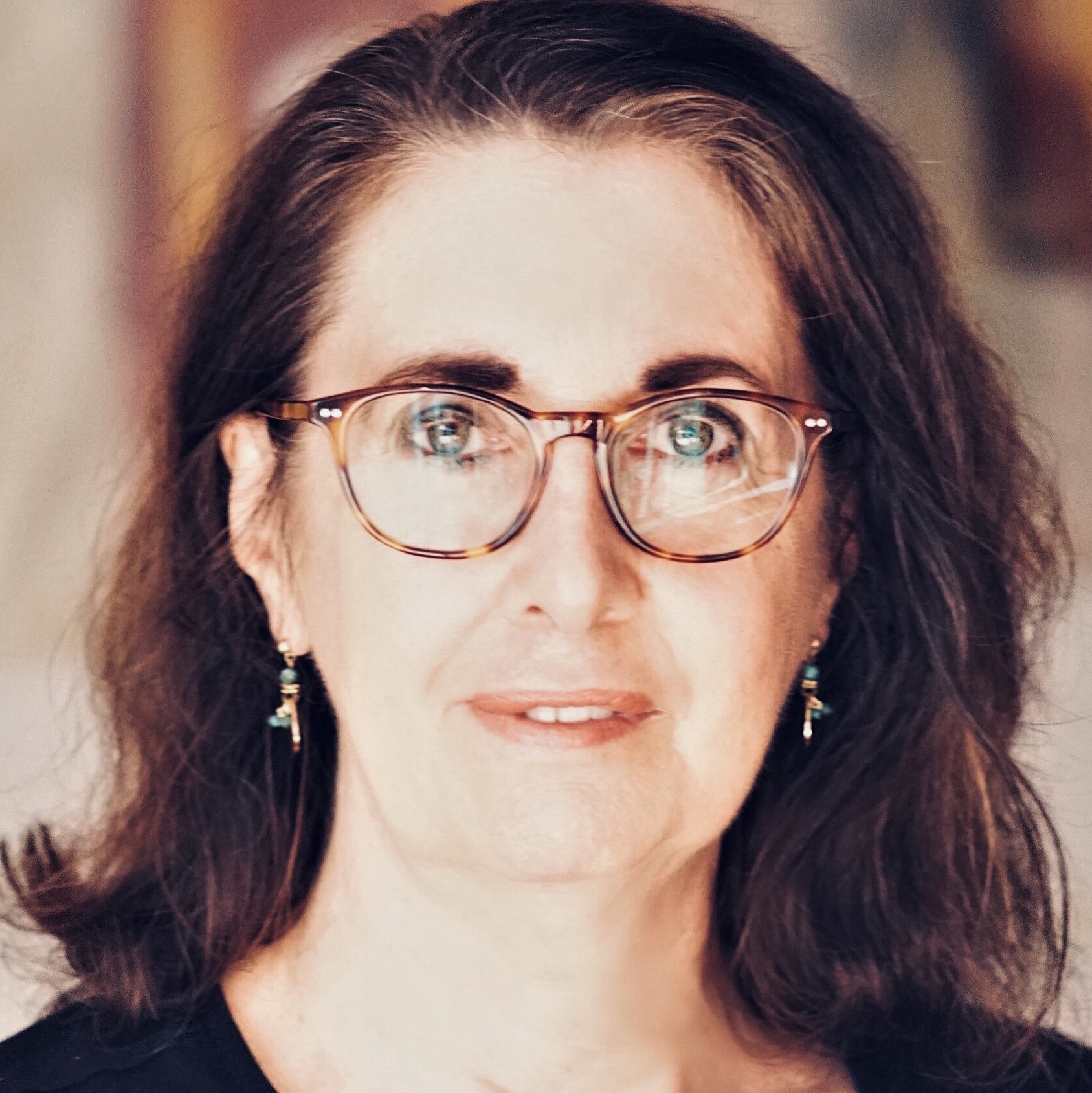 Julie Manning is a late-career poet. Her work has previously been published in Australian Book Review, Cordite, and the Grieve Anthology (Hunter Writers Centre), and it is forthcoming in Overland. She was longlisted for the University of Canberra Vice Chancellors International Poetry Prize in 2019 and selected at the Queensland Poetry Festival as an Emerging Poet for 2019. She lives on Moreton Bay in Queensland.
Julie Manning is a late-career poet. Her work has previously been published in Australian Book Review, Cordite, and the Grieve Anthology (Hunter Writers Centre), and it is forthcoming in Overland. She was longlisted for the University of Canberra Vice Chancellors International Poetry Prize in 2019 and selected at the Queensland Poetry Festival as an Emerging Poet for 2019. She lives on Moreton Bay in Queensland.
Lachlan Brown (NSW), 'Precision Signs' – Shortlisted
Claire G. Coleman (Vic.), 'That Wadjela Tongue' – Shortlisted
Diane Fahey (Vic.), 'The Yellow Room' – Longlisted
S.J. Finn (Vic.), 'A Morning Shot' – Longlisted
Ross Gillett (Vic.), 'South Coast Sonnets' – Shortlisted
A. Frances Johnson (Vic.), 'My Father's Thesaurus' – Shortlisted
Anthony Lawrence (QLD), 'Zoologistics' – Longlisted
Kathryn Lyster (NSW), 'Diana' – Longlisted
Julie Manning (QLD), 'Constellation of Bees' – Shortlisted
Greg McLaren (NSW), 'Autumn mediations' – Longlisted
Claire Potter (United Kingdom), 'Of Birds' Feet' – Longlisted
Gig Ryan (Vic.), 'Fortune's Favours' – Longlisted
Corey Wakeling (Japan), 'Drafts in Red' – Longlisted
Click here for more information about past winners and to read their poems.
We gratefully acknowledge the long-standing support of Morag Fraser AM and Andrew Taylor AM.
ABR Behrouz Boochani Fellowship – worth $10,000
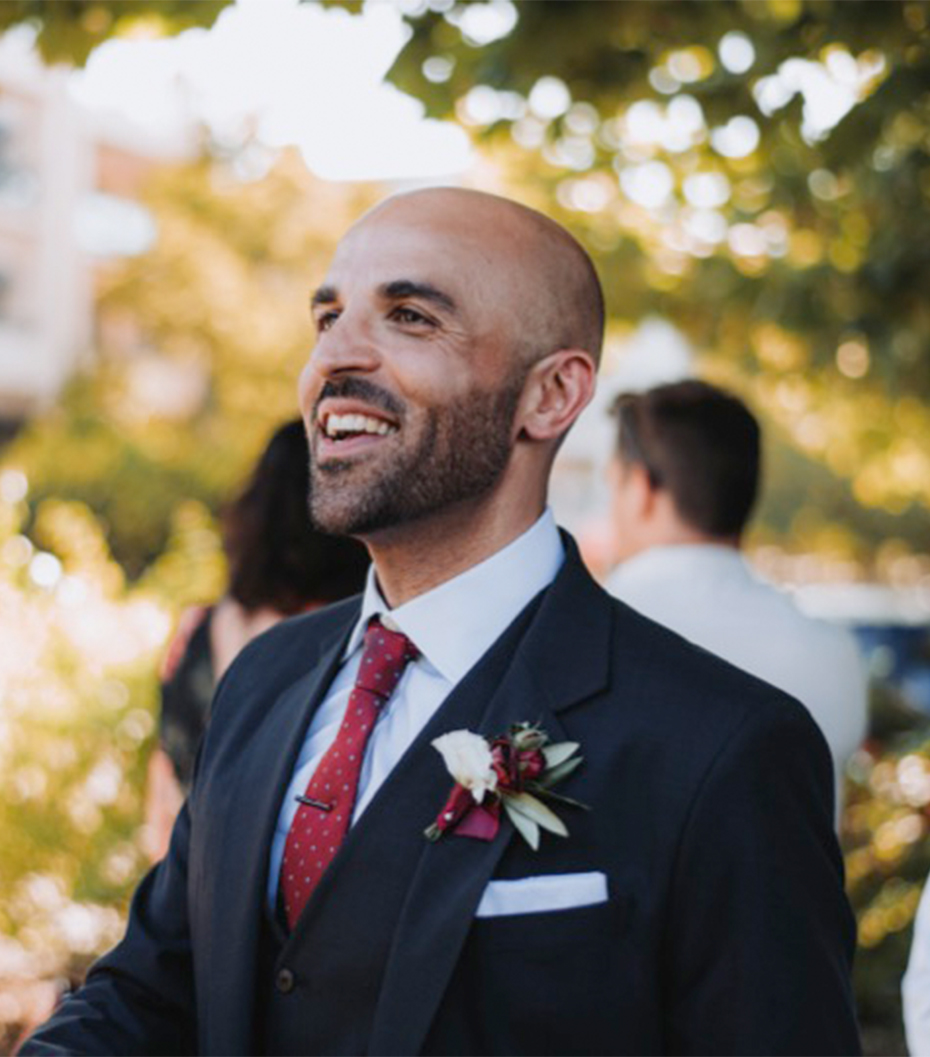 Hessom RazaviAustralian Book Review has much pleasure in naming Hessom Razavi as the recipient of the ABR Behrouz Boochani Fellowship. The Fellowship, worth $10,000, honours the artistry, courage, and moral leadership of Behrouz Boochani, the award-winning author of No Friend But the Mountains (2018), who has been imprisoned on Manus Island since 2013. Dr Razavi will make a significant contribution to the magazine in 2020 with a series of three substantial articles on refugees, statelessness, and human rights. The Fellowship is funded by Peter McMullin, a lawyer, philanthropist, and businessman. Hessom Razavi was chosen from a quality international field. The selection panel comprised Nobel Laureate J.M. Coetzee, Michelle Foster (Director of the Peter McMullin Centre on Statelessness at the University of Melbourne), and Peter Rose, Editor of ABR.
Hessom RazaviAustralian Book Review has much pleasure in naming Hessom Razavi as the recipient of the ABR Behrouz Boochani Fellowship. The Fellowship, worth $10,000, honours the artistry, courage, and moral leadership of Behrouz Boochani, the award-winning author of No Friend But the Mountains (2018), who has been imprisoned on Manus Island since 2013. Dr Razavi will make a significant contribution to the magazine in 2020 with a series of three substantial articles on refugees, statelessness, and human rights. The Fellowship is funded by Peter McMullin, a lawyer, philanthropist, and businessman. Hessom Razavi was chosen from a quality international field. The selection panel comprised Nobel Laureate J.M. Coetzee, Michelle Foster (Director of the Peter McMullin Centre on Statelessness at the University of Melbourne), and Peter Rose, Editor of ABR.
About Hessom Razavi
Hessom Razavi is a writer and doctor based in Perth. He was born in Iran in 1976. In 1983 his family fled Iran to escape political persecution. He grew up in Pakistan and the United Kingdom before migrating to Australia when he was thirteen. He completed his studies as an ophthalmologist in 2015 and has visited Manus Island and Nauru in a medical capacity. He also writes poetry and essays, and he is currently working on his first collection. He describes himself as an exile, migrant, professional, and ‘perennial outsider’. His early experience of exile and state violence, and his subsequent qualifications as a writer and clinician, give him an unusual perspective on the plight of the millions of people around the world who are oppressed, anathematised, and endangered.
‘It’s an honour and delight to receive ABR’s inaugural Behrouz Boochani Fellowship. I accept it in the spirit of mutual respect for asylum seekers, refugees, the Australian people, and our regional neighbours. I am grateful to the magazine and to Peter McMullin. I very much look forward to working with ABR and the Peter McMullin Centre on Statelessness in 2020. My goal will be to help shift awareness and raise empathy among those Australians who remain uninformed or ambivalent, particularly moderate conservatives, young people, and those who are open to reason. Ultimately, I work to contribute to the collective moment – medical, legal, artistic, political – that advocates for more humane, sustainable outcomes for vulnerable people who seek protection in Australia.’
Hessom Razavi
‘For decades, Australia has normalised the indefinite imprisonment of refugees. This is a critical time: we need to support writers inside the prison camps and also those people who are recording this history outside the prisons. It is extremely important that we support the writers and researchers recording this history in any way we can. The Fellowship is long overdue but also a great step in helping to document the history and to transform the present situation. What Australian Book Review is doing is valuable for many reasons. The Fellowship promises to be an important contribution to the discourse.’
Behrouz Boochani
Interviews
Hessom Razavi is available for interviews. To arrange one, contact Peter Rose: This email address is being protected from spambots. You need JavaScript enabled to view it.
Click here to find out more about the ABR Fellowship program.
ABR Behrouz Boochani Fellowship - Frequently Asked Questions
What is Australian Book Review?
Australian Book Review (ABR) is one of Australia’s leading cultural magazines. Created in 1961, it lapsed in 1974 and was revived in 1978. ABR is a fully independent non-profit organisation. Its primary aims are several: to foster high critical standards; to provide an outlet for fine new writing; and to contribute to the preservation of literary values and a full appreciation of Australia’s literary heritage.
ABR publishes reviews, essays, commentaries, interviews, and new creative writing. It is available in print and online. ABR’s diverse programs include three prestigious international prizes, writers’ fellowships, themed issues, national events, cultural tours, and paid editorial internships.
What is the ABR Fellowship program?
ABR Fellowships are intended to reward outstanding Australian writers, to enhance ABR through the publication of long-form journalism, and to advance the magazine’s commitment to ideas and critical debate. The Fellows work closely with ABR staff, especially the Editor, Peter Rose.
Who is Behrouz Boochani?
This Fellowship honours the immense artistry, courage and moral leadership of Behrouz Boochani, an Iranian-Kurdish poet, journalist, memoirist, film producer and human rights activist who has been held on Manus Island since 2013. Behrouz Boochani’s memoir, No Friend But the Mountains (Picador, 2018, translated by Omid Tofighian) won the 2019 Victorian Prize for Literature and Victorian, plus the New South Wales Premiers’ Literary Awards.
Who can apply for the 2019 ABR Behrouz Boochani Fellowship?
This Fellowship is open to English-speaking writers around the world. Any writer with a publication record is eligible. ABR staff and Board members are ineligible, as are staff, board members, and PhD students at the Peter McMullin Centre on Statelessness. Contributors to ABR are encouraged to apply.
What is the Peter McMullin Centre on Statelessness?
The Peter McMullin Centre on Statelessness was established at the Melbourne Law School in February 2018 as a result of the generous support of Peter and Ruth McMullin. The Centre undertakes research, teaching and engagement activities aimed at reducing statelessness and protecting the rights of stateless people in Australia, the Asia Pacific region, and as appropriate more broadly. Learn more about the work of the Centre at https://law.unimelb.edu.au/centres/statelessness
Are the Fellowships themed?
Some are, some aren’t. The ABR Behrouz Boochani Fellowship is. We look for applications about any aspect of refugees, statelessness or human rights.
Is this a purely academic Fellowship?
Not at all. We welcome applications from a broad range of writers: journalists, commentators, scholars, activists, creative writers, etc. ABR is not an academic journal. We seek engaging, creative non-fiction journalism of the kind you will find in The New Yorker or the London Review of Books. Links to essays by past Fellows can be found here.
Are you looking for finished articles from applicants?
No. We seek cogent proposals for non-fiction articles to be developed over the course of the Fellowship, in collaboration with the Editor. Unlike the Calibre Essay Prize, the Fellowship program is not for finished works.
How much are the Fellowships worth?
The Fellow will receive a total of $10,000, payable thus: $4,000 on announcement of the Fellowship; and two further payments on $3,000 on publication of the final two contributions to the magazine.
I don’t know anything about ABR. May I still apply?
Applicants must demonstrate familiarity with the magazine and must persuade the panel that their articles would complement other writings in ABR and win us new readers. Applications who do not refer to the magazine in their applications, or who don’t demonstrate awareness of ABR’s needs and directions, are unlikely to be successful.
Is it possible to write the article with a friend or colleague?
No. Single-author works only.
How do I apply?
Applicants must read the guidelines of the Fellowship for which they are interested in applying and send us a succinct but comprehensive proposal (three pages maximum), plus a CV of no more than three pages and two short writing samples. Please nominate two professional/literary referees (names, email addresses and phone numbers only). Note that we are looking for proposals – not finished articles or chapters. Applications must be received by the closing date of the relevant Fellowship. There is no application fee. Applicants are strongly encouraged to discuss their proposals with the Editor before submitting them: (03) 9699 8822 or via email: This email address is being protected from spambots. You need JavaScript enabled to view it. NB applications for the ABR Behrouz Boochani Fellowship are now closed.
How are Fellows selected?
The Fellowship will be awarded by Australian Book Review on the advice of a committee including Peter Rose, the Editor of ABR, and Professor Michelle Foster, Director of the Peter McMullin Centre on Statelessness at the University of Melbourne, and author J.M. Coetzee. Shortlisted applicants will attend an interview in person or via Skype. No correspondence will be entered into once the decision has been announced. ABR reserves the right not to award the Fellowship.
Are the ABR Fellows expected to complete their projects at the ABR office in Melbourne?
No. Most of the editorial contact is via email or the telephone. Some meetings may be desirable during the course of the Fellowship. These are important collaborative partnerships between the magazine and the Fellows.
What kind of editorial support do Fellows enjoy?
ABR Fellows enjoy a special status at the magazine – as our senior contributors. The Fellow will work with the Editor closely throughout the Fellowship. We edit promptly, closely, and respectfully. ABR is committed to presenting the Fellow’s work with the utmost finesse. The Editor is always available to discuss the project, to respond to ideas, and to read drafts. Peter Rose edits the articles in consultation with the Fellows, and each article is then proofread by at least three editors.
Are there opportunities for discussions with other writers or experts in the field?
We encourage Fellows to lead roundtable discussions with colleagues and specialists at a formative stage in the Fellowship. These can be held at the Centre on Statelessness in Melbourne. ABR assists with the organisation of these roundtables. Fellows usually chair these gatherings, which have been most fruitful in the past. The Fellow is also encouraged to participate in other events at the Peter McMullin Centre on Statelessness, including attending the monthly seminar series where relevant.
Where are the Fellowship articles published?
In the print and digital editions of ABR.
Would ABR Fellows be required to take part in the promotion of the published article?
Yes.
Syndication
If articles are syndicated in newspapers (with the Fellow’s permission), the Fellow and ABR will each receive 50%.

